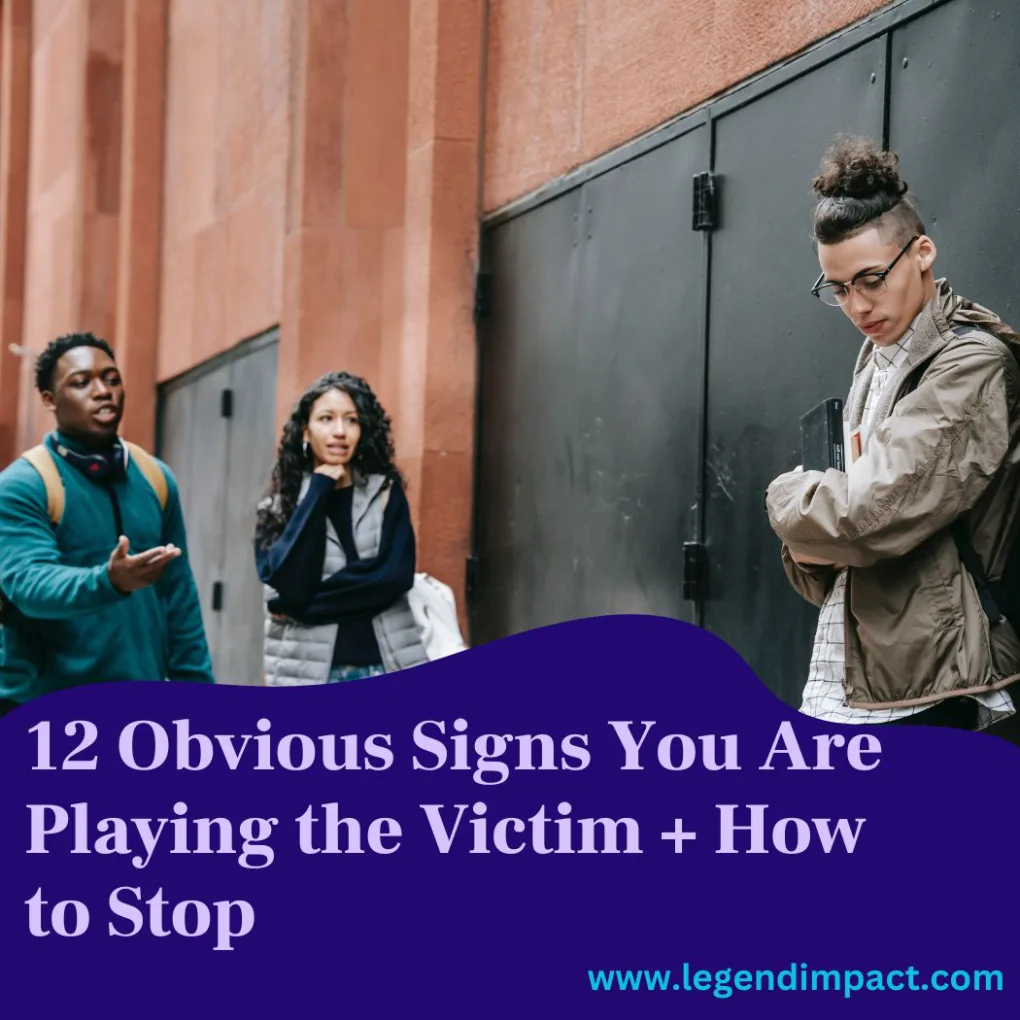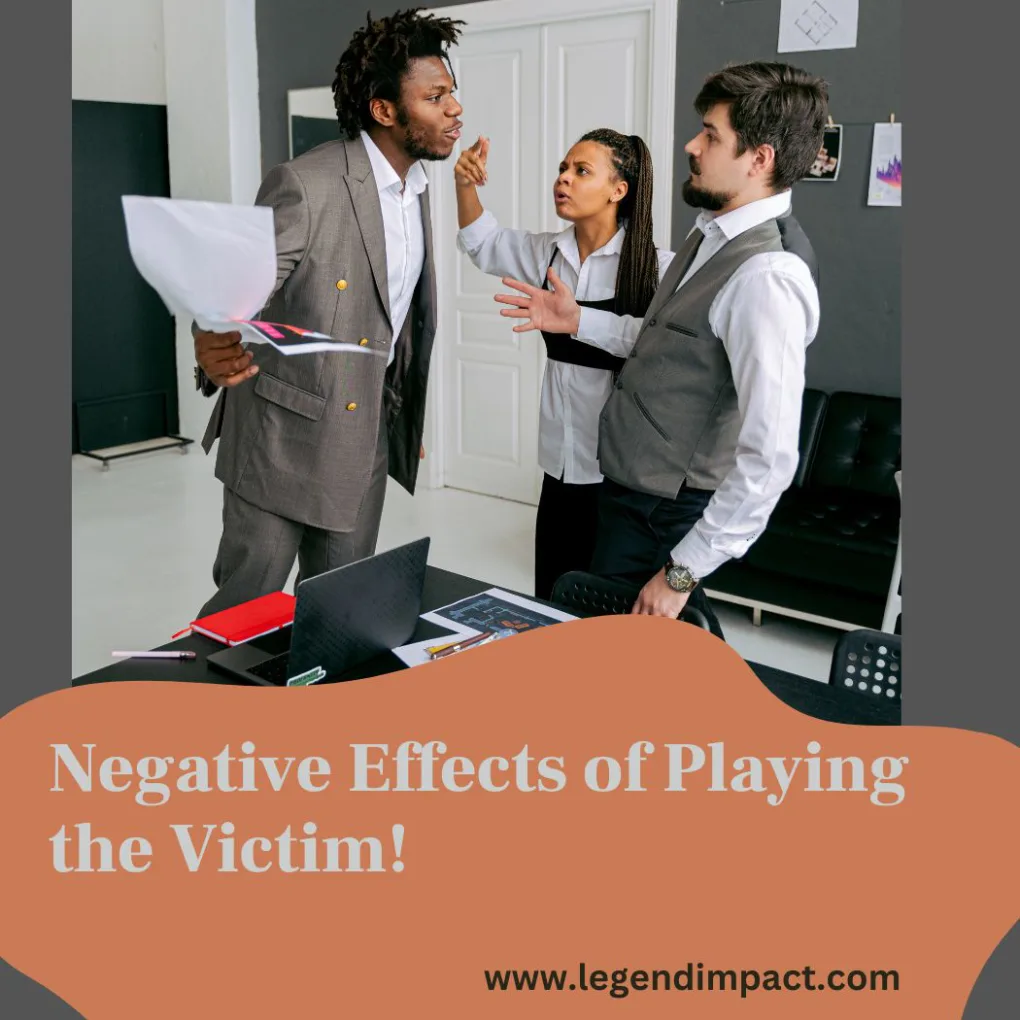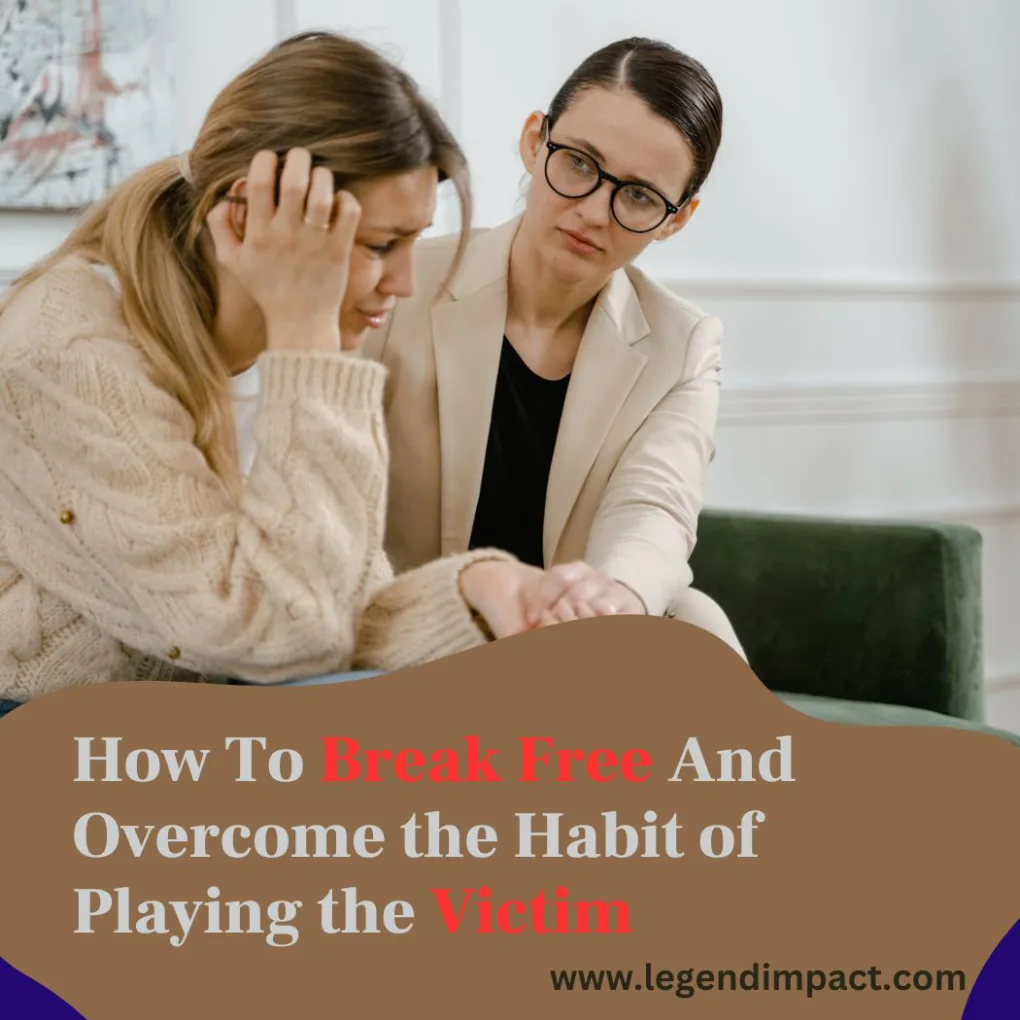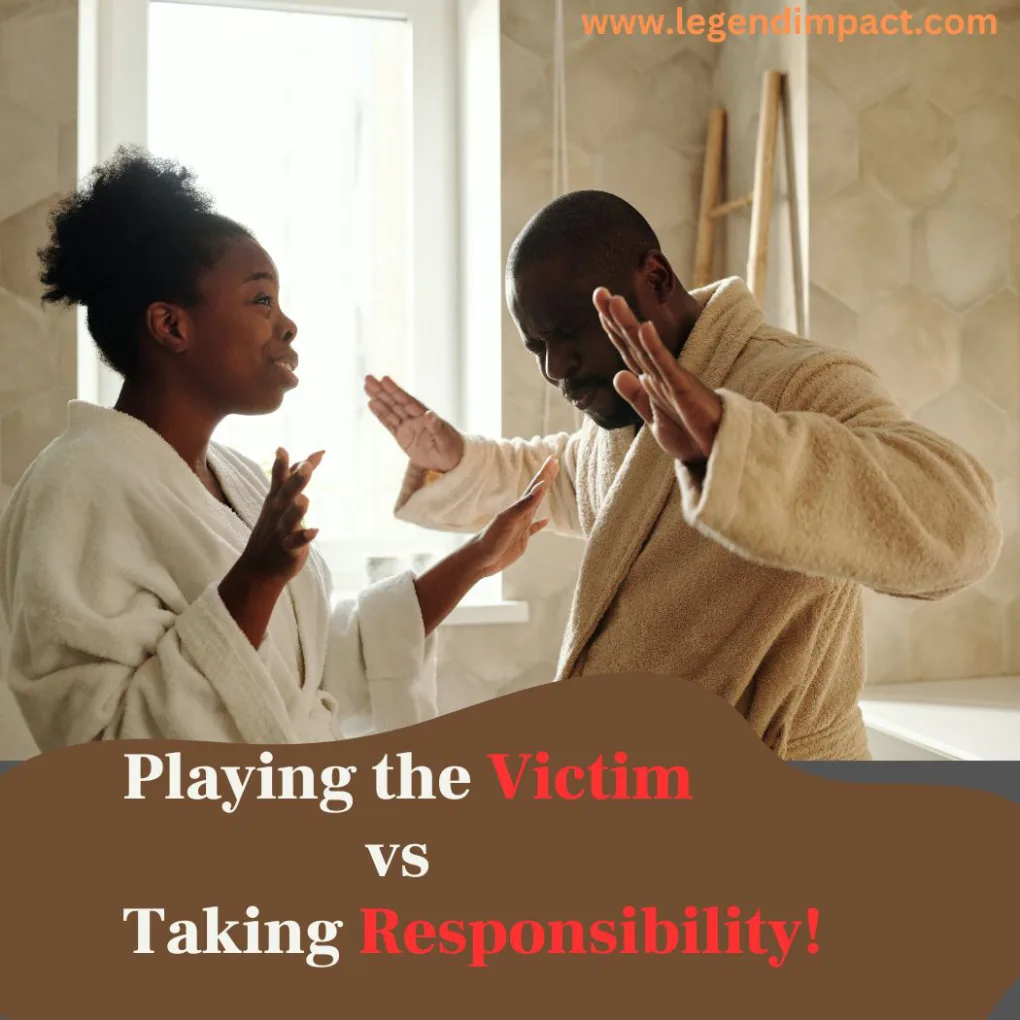
Do you often feel powerless over life’s circumstances, blaming others for your problems? If so, you may be playing the victim, a mindset that can lead to an array of personal and social challenges. In this comprehensive guide, we’ll explore the psychology behind playing the victim, its adverse effects, and practical steps you can take to regain control of your life.
The Psychology Behind Playing the Victim: What You Need to Know
Why People Play the Victim
Playing the victim may seem straightforward, but the psychological reasons are often complex and deeply rooted. It’s crucial to understand that playing the victim isn’t usually a conscious choice; it’s a learned behavior molded by a combination of past experiences, psychological traits, and sometimes survival instincts.
Evolutionary Psychology Perspective
From an evolutionary standpoint, portraying oneself as a victim could have survival benefits in a tribal society. Being perceived as a victim could elicit sympathy and protective instincts from others, thereby increasing the individual’s chances of survival. However, this often backfires in modern society, leading to social and emotional complications.
Attachment Theory
Attachment theory posits that early-life experiences with caregivers can significantly influence personality and coping mechanisms in adulthood. Suppose a child grows up in an environment where playing the victim is either rewarded or modeled by caregivers. In that case, this behavior may become a deep-seated part of their adult personality.
Learned Behavior
Sometimes, playing the victim is learned from family, peers, or cultural influences. For instance, if you grow up in a household where one parent always blames the other for their misfortunes, you may internalize this behavior as an appropriate way to cope with challenges. Likewise, peer pressure and social norms can reinforce this mindset, making it a vicious cycle that is hard to break.
Understanding the psychology behind playing the victim can provide invaluable insights into why you behave as you do. It also forms the foundation for breaking free from this debilitating mindset. Armed with this knowledge, you can better tackle the complexities of the victim mentality and work towards a more empowered future.
Signs You’re Playing the Victim and How to Stop
Whether we like to admit it or not, self-awareness is the first step toward breaking the cycle of playing the victim. We must look inward and assess whether our thoughts, feelings, and behaviors align with this self-defeating mindset. To make this task easier, here are nine clear signs you’re playing the victim, along with guidance on how to make a positive change.
Self-Assessment Questions
Before diving into the signs, pause and ask yourself a few questions. These could include: “Do I often blame others for my problems?”, “Do I feel powerless to change my circumstances?” or “Do I frequently expect bad things to happen to me?” Honest answers to these questions can serve as a preliminary gauge of whether you’re playing the victim.
12 Obvious Signs You’re Playing the Victim
The phrase “playing the victim” may bring to mind a host of stereotypes and preconceptions, but the reality is more nuanced than you might think. While it’s not always easy to spot when falling into a victim mindset, some telltale signs can serve as red flags. Identifying these markers can help you take the first step toward change. Below, we’ve outlined 12 signs you might be playing the victim.
1. Constant Complaining
If you find that most of your conversations revolve around your problems and challenges and make little effort to seek solutions, this is a clear sign. Constant complaining without proactive action solidifies your role as a victim.
2. Blaming Others
Pointing fingers at others for setbacks or difficulties is another hallmark of the victim mentality. While it’s true that external circumstances can affect your life, constantly blaming others prevents you from taking any personal responsibility.
3. Attracting Drama
Some people who play the victim are drama magnets. They seem to attract or create situations that validate their victim status. You might play into this mentality if you find that drama follows you wherever you go.
4. Refusing Help or Advice
Playing the victim often includes turning down help or advice, as accepting assistance could disrupt the narrative that the world is against you. Take heed if you notice yourself refusing service even when it’s genuinely needed.
5. Overgeneralizing
Statements like “This always happens to me” or “I never get a break” are indications of overgeneralizing. This cognitive distortion makes it seem like adverse events are far more prevalent than they are, fortifying your victim mindset.
6. Feeling Powerless
A defining characteristic of playing the victim is feeling powerless to change your situation. If you feel trapped by your circumstances and unable to take steps to improve them, it’s time to reconsider your mindset.
7. Lack of Accountability
You’re avoiding accountability if you never acknowledge your role in your problems and setbacks. This lack of personal responsibility is a cornerstone of the victim mentality.
8. Manipulative Behavior
Sometimes, playing the victim is a manipulative tactic. You might exaggerate or distort situations to win sympathy or concessions from others. Such behavior only serves to perpetuate your victim status and can strain relationships.
9. Avoiding Responsibility
A reluctance to take on responsibilities is another red flag. Dodging tasks or commitments may stem from a fear that you’ll fail, reinforcing your belief that you’re a victim of circumstance.
10. Enjoying Self-Pity
Feeling sorry for yourself might bring some emotional relief, but you’re perpetuating a victim mindset when it becomes a go-to response. If you find comfort in wallowing in your problems, it’s time for self-reflection.
11. Excessive Need for Validation
If you constantly seek validation from others and require others to “rescue” you emotionally, you may be playing the victim. This excessive need for external approval drains you and those around you.
12. Reluctance to Take Action
If you’re always complaining about your life but not taking steps to change it, you may fall into the victimhood trap. This reluctance to take action puts you in a passive role, making avoiding responsibility for your life easier.
Recognizing these signs in yourself doesn’t mean you’re a terrible person; it means you’re human and have areas where you can grow. The first step toward breaking free from playing the victim is acknowledging the behavior. Once you’ve done that, you can take action to change your mindset and, subsequently, your life.
Negative Effects of Playing the Victim:

When you’re caught in the loop of playing the victim, it can have profound and far-reaching consequences. While you may initially find some form of emotional relief or social benefits, the long-term adverse effects far outweigh any short-term gains. Let’s delve into how playing the victim impacts various aspects of your life.
1. Reduced Emotional Well-being
Playing the victim can take a massive toll on your emotional health. Continuously seeing yourself as the victim traps you in a cycle of negative emotions. Feelings of anger, sadness, resentment, and despair become your constant companions, leading to emotional exhaustion. Although it might feel comforting to absolve yourself of responsibility in the short term, the longer you sustain this victim mindset, the more entrapping it becomes.
2. Lack of Personal Growth and Productivity
The victim mentality often prevents personal growth and self-improvement. Since you’re focused on externalizing blame, you miss opportunities to introspect, learn, and evolve, thus stunting your emotional maturity.
3. Paralysis by Analysis
The cycle of playing the victim can cloud your judgment, making even simple decisions seem overwhelming. When you’re always looking outside yourself for the cause of your problems, you relinquish the control needed to make rational choices.
You may find yourself overthinking decisions, trapped in a cycle of what-ifs that paralyze your ability to make choices. This indecisiveness further solidifies your victim status, as you find it increasingly difficult to take actions that could improve your circumstances.
4. Anxiety and Stress
The emotional toll of playing the victim can be both intense and subtle, affecting various aspects of your life. The constant belief that you’re a victim can create a state of perpetual anxiety and stress. This heightened emotional state can have numerous adverse effects, from physical health issues like high blood pressure, heart disease, gastrointestinal problems, lack of focus, and depression. These physical ailments add another layer of complexity to the cycle of victimization, making it even more challenging to break free.
5. Weakening Family Bonds
The victim mindset often leads to a toxic emotional environment. This toxic atmosphere can make family interactions a source of stress rather than comfort, affecting everyone in the household. If one family member consistently plays the victim, it can weaken the bonds between family members. This strain can lead to reduced communication and emotional distance, which are harmful in the long term.
6. Damaging Professional Reputation and opportunities
In the professional sphere, playing the victim can be particularly detrimental. Over time, colleagues and superiors may find it challenging to collaborate with someone who perpetually sees themselves as a victim. This can limit your professional opportunities and growth.
A reputation as someone who shirks responsibility and blames others can be highly damaging professionally. It may even follow you as you move between jobs or sectors. The lack of trust in your ability to take responsibility can significantly limit your career opportunities.
7. Pessimistic Outlook
The habit of playing the victim can fundamentally alter the way you think, making it difficult to perceive situations objectively. The victim mindset is intrinsically tied to pessimism. Over time, this mentality can cloud your judgment, making it challenging to see positive possibilities or solutions in any situation. You selectively notice and focus on events that confirm your preexisting beliefs, further solidifying your mindset as a victim.
8. Low Self-Esteem and Self-Worth
One of the most devastating impacts of playing the victim is the erosion of self-esteem and self-worth. Believing you’re powerless can reduce self-efficacy—the belief that you can accomplish tasks and succeed. This loss can make you less likely to take proactive steps to improve your situation. When you’re in the victim mindset, you tend to rely heavily on your partner for emotional validation. This dependency can turn toxic quickly, placing an undue burden on the other party.
9. Identity Crisis
In severe cases, playing the victim can even lead to an identity crisis. Breaking free can be disorienting and emotionally turbulent if your sense of self is wrapped up in being a victim.
10. Blame-Shifting
Instead of taking responsibility for personal actions and decisions, playing the victim often involves shifting the blame to your partner. This lack of accountability can perpetuate a toxic cycle.
11. Lack of Emotional Connection
When trapped in a victim mindset, authentic emotional connection becomes almost impossible. Instead of sharing and growing together, interactions are reduced to blame games and emotional manipulation. If one party is always playing the victim, it can erode the essential trust that is the foundation of a healthy relationship. While a victim mentality might attract initial sympathy, it rarely fosters a deeper emotional connection. True friendships are built on shared experiences, trust, and mutual growth, not just on one-sided emotional support.
12. Loss of Autonomy
Losing your sense of self and autonomy is the most profound danger of playing the victim. When you see yourself solely as a victim, you surrender your agency, ability to make choices, and capacity to influence outcomes. Playing the victim can permanently stunt personal growth. By relinquishing control and blaming external factors, you lose the opportunity for self-improvement and skill development.
13. Emotional Drain on Friends
Your friends may initially be sympathetic and willing to help, but constant complaining and blaming can become emotionally draining for them. This emotional toll can make them reluctant to spend time with you.
In any friendship, there’s an expectation of mutual support. However, constantly playing the victim can create an imbalance, leading to strain and, eventually, rupture in relationships.
The negative effects of playing the victim can infiltrate every aspect of your life, from emotional well-being to physical health and even career prospects. Recognizing these consequences is the first step toward change, empowering you to break the cycle and reclaim your life.
Breaking Free: Overcoming the Habit of Playing the Victim

Confronting the mentality of playing the victim is not just an intellectual exercise; it’s a life-altering endeavor. Failing to break the cycle can trap you in a whirlpool of self-destructive behavior and broken relationships.
Recognizing that you’ve been playing the victim is the first crucial step toward healing and empowerment. Breaking free from this mindset isn’t just about ending a cycle; it’s about starting a new chapter in your life, one where you reclaim your agency and forge healthier relationships with others and yourself. Let’s explore some effective strategies for overcoming this self-limiting habit.
1. Acknowledge the Problem
The first step in solving any problem is acknowledging that it exists. Own up to your habit of playing the victim. Only after this realization can you begin to make constructive changes.
2. Take Responsibility
The next step is taking responsibility for your actions, choices, and consequences. This doesn’t mean blaming yourself for everything; it means having the maturity to own your part in various situations.
3. Reclaim Your Power
Realize that you have the power to change. This mental shift is critical for breaking the cycle. Understand that you can influence outcomes and proactively change your circumstances.
4. Reach Out for Support
You do not have to break free from a victim mentality alone. Whether it’s friends, family, or mental health professionals, don’t hesitate to seek support and guidance.
5. Self-Reflect and Adapt
Make it a habit to reflect on your actions, thoughts, and feelings regularly. Self-awareness is crucial for breaking the cycle and ensuring you don’t revert to old habits.
6. Implement Life Changes
Sometimes, breaking the cycle means making significant changes in your life. This could involve ending toxic relationships, changing careers, or relocating to a new place that offers a fresh start.
7. Identify Negative Thought Patterns
Become aware of the automatic negative thoughts that support your victim mentality. These could include thoughts like “I’m always unlucky” or “People are out to get me.”
8. Replace with Positive Affirmations
Combat these negative thoughts by replacing them with positive affirmations or more balanced thoughts. For instance, instead of thinking, “I can’t do anything right,” tell yourself, “I make mistakes, but I can learn and improve.”
9. Say No When Necessary
Part of breaking free from victim-hood is learning to say no when needed. This could be refusing extra work that you can’t handle or saying no to social events when you need time for self-care.
10. Create Emotional Boundaries
Learn to protect your emotional energy by identifying and distancing yourself from relationships or situations that trigger your victim mentality.
11. Engage in Self-Care
Take time to nurture yourself through activities that bring joy and relaxation. Self-care isn’t just an indulgence; it’s essential for mental health and emotional resilience.
12. Use Coping Mechanisms
Identify healthy coping mechanisms like exercise, journaling, or talking to a friend or counselor. Utilize these strategies when you find yourself slipping back into the victim role.
13. Keep a Progress Journal
Keep track of your thoughts, triggers, and improvements. Celebrate small victories and analyze setbacks.
Breaking the cycle of playing the victim is a journey that requires courage, effort, and persistence. The dangers of not addressing this issue are too significant to ignore, but the rewards of breaking free are well worth the effort. With time and commitment, you can reclaim your autonomy, improve your relationships, and open the door to a more fulfilling life.
Playing the Victim vs. Taking Responsibility

A close look at the dynamics between playing the victim and taking responsibility can provide a transformative perspective. These two attitudes are often opposite when facing life’s challenges and your emotional well-being. Understanding the differences can be the key to a more empowered and fulfilling life.
The Mindset of Playing the Victim
When you play the victim, the world seems to be against you, and you feel powerless to change your circumstances. Your mindset becomes one of reactivity rather than proactivity, focused more on what has happened to you than what you can do about it.
Playing the victim places you in a passive role. You see yourself as acted upon by external forces rather than as an actor capable of affecting change. This passivity restricts your ability to deal effectively with life’s challenges.
Long-term engagement in the victim mentality erodes self-esteem. Over time, you start believing that you’re not capable or deserving of better circumstances, further cementing your role as a victim.
The Power of Taking Responsibility
In stark contrast, taking responsibility is empowering. This mindset acknowledges that while you can’t control everything that happens to you, you can manage your reaction to it.
Taking responsibility involves owning your actions, decisions, and emotional responses. Even in unfavorable circumstances, you remain accountable for how you handle the situation, which can be incredibly liberating.
When you take responsibility, you open yourself up to growth and learning. Instead of wallowing in self-pity or blame, you analyze what went wrong, your role, and how to avoid similar pitfalls. This learning process builds resilience and equips you to face future challenges more effectively.
By understanding the detrimental cycle of playing the victim and embracing the liberating power of taking responsibility, you can shift from a life of limitations to endless possibilities.
Take Charge of Your Life: Stop Playing the Victim Today
If you’ve made it this far, congratulations! Recognizing the need for change is the first step toward a more empowered, fulfilling life. We’ve peeled back the layers of what playing the victim entails, how it manifests in various aspects of your life, and most importantly, how to break free from this crippling mindset. Remember, you hold the power to change your narrative. Don’t let your life story be one where you’re perpetually the victim. Take charge and rewrite your story today.
A Special Invitation for You
We believe that empowerment is a collective journey, and we’re here to support you every step of the way. To never miss our life-enhancing content, consider subscribing to our newsletter. Get the tools, tips, and inspiration to rise above challenges and thrive delivered straight to your inbox.
Let’s Get Social!
For daily doses of motivation and helpful life hacks, follow us on our social media platforms—Facebook, Instagram, and Twitter. You’ll join a vibrant community where you can interact, learn, and grow.
We Want to Hear from You!
Finally, your feedback is invaluable to us. Please drop a comment to let us know what resonated with you the most, or share your journey towards breaking free from playing the victim. Your story could be the inspiration someone else needs.
Share the Knowledge
If you found this article helpful, someone you know will, too. Share it with friends and loved ones—you never know whose life you could change.
👉 Take Action Now: Bookmark this page for future reference, share it on your social media, and take that first step towards self-improvement.
It’s time to stop playing the victim and start living a life you’re proud of. Your future self will thank you.
Drop a comment, share our content with your friends and loved ones, and remember to subscribe to our newsletter. Follow us on Facebook, Instagram, and Twitter to stay updated with the latest content.

Leave a Reply